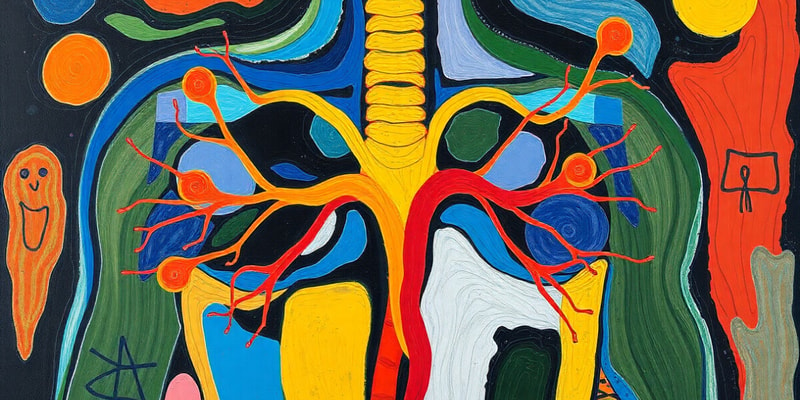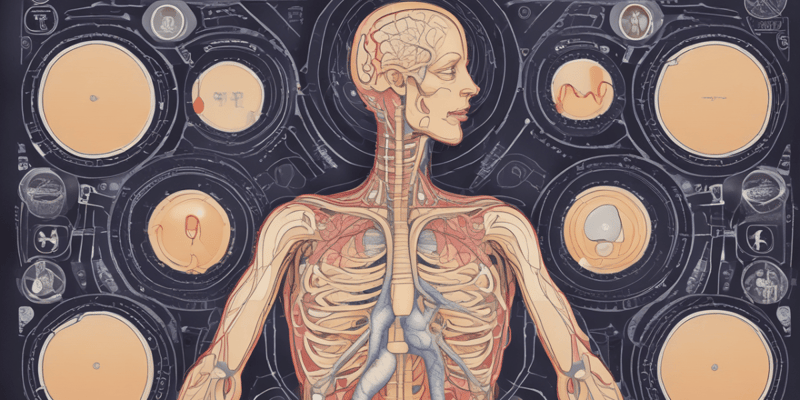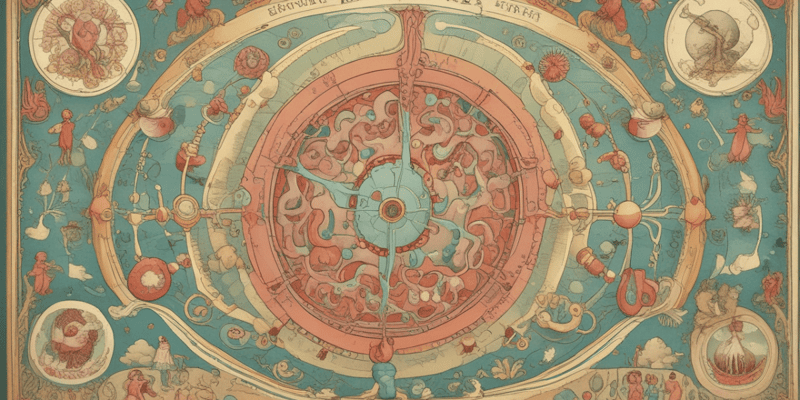Podcast
Questions and Answers
What is one of the primary roles of the endocrine system?
What is one of the primary roles of the endocrine system?
Which of the following glands is classified as endocrine?
Which of the following glands is classified as endocrine?
What hormone is primarily responsible for regulating blood sugar levels?
What hormone is primarily responsible for regulating blood sugar levels?
How does the hypothalamus contribute to homeostasis?
How does the hypothalamus contribute to homeostasis?
Signup and view all the answers
Which feedback mechanism typically enhances or increases the effects of a hormone?
Which feedback mechanism typically enhances or increases the effects of a hormone?
Signup and view all the answers
Which hormone is produced by the adrenal medulla as part of the fight or flight response?
Which hormone is produced by the adrenal medulla as part of the fight or flight response?
Signup and view all the answers
What are the main hormones produced by the anterior pituitary gland?
What are the main hormones produced by the anterior pituitary gland?
Signup and view all the answers
Which of the following best describes exocrine glands?
Which of the following best describes exocrine glands?
Signup and view all the answers
What is the role of the pineal gland?
What is the role of the pineal gland?
Signup and view all the answers
How do environmental contaminants affect the endocrine system?
How do environmental contaminants affect the endocrine system?
Signup and view all the answers
What type of hormones cannot pass through the cell membrane and must use surface receptors?
What type of hormones cannot pass through the cell membrane and must use surface receptors?
Signup and view all the answers
Which hormone is produced by the hypothalamus to stimulate the release of ACTH from the anterior pituitary?
Which hormone is produced by the hypothalamus to stimulate the release of ACTH from the anterior pituitary?
Signup and view all the answers
Which hormone plays a crucial role in the positive feedback mechanism during childbirth?
Which hormone plays a crucial role in the positive feedback mechanism during childbirth?
Signup and view all the answers
What is the primary function of glucagon in the body?
What is the primary function of glucagon in the body?
Signup and view all the answers
Which of the following hormones is NOT stored in the posterior pituitary?
Which of the following hormones is NOT stored in the posterior pituitary?
Signup and view all the answers
What role does the hypothalamus play in the regulation of the endocrine system?
What role does the hypothalamus play in the regulation of the endocrine system?
Signup and view all the answers
What is one health effect associated with endocrine disruptors?
What is one health effect associated with endocrine disruptors?
Signup and view all the answers
During which physiological condition is adrenaline predominantly released?
During which physiological condition is adrenaline predominantly released?
Signup and view all the answers
What is the mechanism of action for fat-soluble hormones?
What is the mechanism of action for fat-soluble hormones?
Signup and view all the answers
What distinguishes negative feedback from positive feedback in hormonal regulation?
What distinguishes negative feedback from positive feedback in hormonal regulation?
Signup and view all the answers
Study Notes
Endocrine System Function
- Regulates bodily functions via hormone secretion into bloodstream
- Maintains homeostasis (stable internal environment – blood sugar/temperature)
- Controls growth/development and tissue repair
- Manages metabolism (energy production/usage)
- Influences sexual development and reproduction
- Responds to stress (e.g., cortisol, adrenaline)
Endocrine vs. Exocrine Glands
- Endocrine Glands: Ductless, secrete hormones directly into blood (e.g., thyroid, adrenal)
- Exocrine Glands: Have ducts, release substances to surfaces or cavities (e.g., sweat, salivary glands)
Endocrine Glands and Tissues
- Hypothalamus: Controls pituitary, regulates hunger/thirst/temperature
-
Pituitary Gland:
- Anterior: Produces growth hormone (GH), thyroid-stimulating hormone (TSH), adrenocorticotropic hormone (ACTH), etc.
- Posterior: Releases antidiuretic hormone (ADH) and oxytocin
- Thyroid Gland: Regulates metabolism and calcium balance
- Parathyroid Glands: Controls blood calcium levels
-
Adrenal Glands:
- Cortex: Produces cortisol (stress response, increases glucose, reduces inflammation) and aldosterone
- Medulla: Secretes adrenaline (fight or flight response – increased heart rate, energy)
- Pancreas: Secretes insulin (lowers blood glucose) and glucagon (raises blood glucose)
-
Gonads:
- Testes: Produce testosterone (male secondary sex characteristics, protein synthesis)
- Ovaries: Produce estrogen (menstrual cycle, secondary sex characteristics) and progesterone
- Pineal Gland: Produces melatonin (sleep regulation)
Hormone Classes and Action
- Water-Soluble Hormones: Cannot pass through cell membranes, bind to surface receptors, use second messengers (e.g., cAMP) to affect cell (e.g., insulin, glucagon, adrenaline)
- Fat-Soluble Hormones: Diffuse through cell membranes, bind to intracellular receptors, affecting gene transcription/protein synthesis (e.g., estrogen, testosterone, cortisol)
Hypothalamus and Homeostasis
- Acts as control center, linking nervous and endocrine systems
- Monitors/adjusts internal states (temperature, hunger, thirst)
- Produces releasing/inhibiting hormones that control pituitary
Hypothalamo-Pituitary Relationship
- Hypothalamus: Produces releasing hormones (e.g., CRH, GnRH)
-
Pituitary Gland:
- Anterior: Stimulated by hypothalamic hormones to produce tropic hormones (e.g., TSH, ACTH)
- Posterior: Stores/releases hypothalamus-produced hormones (ADH, oxytocin)
- Importance: Precise hormone control, homeostasis via growth, metabolism, stress response
Feedback Mechanisms
- Negative Feedback: Inhibits further hormone production when desired level is reached (e.g., high blood sugar → insulin release → blood sugar decreases → insulin secretion stops)
- Positive Feedback: Amplifies original signal (e.g., oxytocin during childbirth → uterine contractions → more oxytocin → stronger contractions)
Major Hormones: Glands, Targets, and Functions
- Insulin (Pancreas): Lowers blood glucose (targets liver, muscles, fat)
- Glucagon (Pancreas): Raises blood glucose (targets liver)
- Thyroid Hormones (T3, T4): Regulate metabolism, growth, energy (targets most body cells)
- Cortisol (Adrenal Cortex): Stress response, increases glucose, reduces inflammation (targets liver, muscles)
- Adrenaline (Adrenal Medulla): Fight or flight (targets heart, muscles)
- Estrogen (Ovaries): Regulates menstrual cycle, secondary sexual characteristics (targets uterus, breasts)
- Testosterone (Testes): Male secondary sex characteristics, protein synthesis (targets muscles, bones)
Environmental Contaminants & Endocrine System
- Endocrine Disruptors: Chemicals (e.g., BPA, phthalates, pesticides) disrupt hormone function
- Mimic/Block: Natural hormones, disrupting normal processes
- Health Effects: Reproductive issues (reduced fertility), developmental delays, increased cancer risk (e.g., breast, prostate)
Studying That Suits You
Use AI to generate personalized quizzes and flashcards to suit your learning preferences.
Description
This quiz covers the functions of the endocrine system, including hormone secretion, regulation of bodily functions, and the distinct roles of endocrine and exocrine glands. Test your knowledge on key hormones, glands, and their impact on metabolism and homeostasis.




